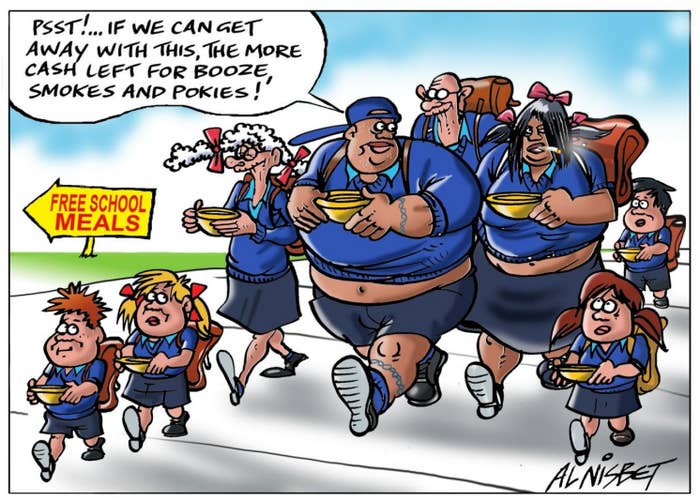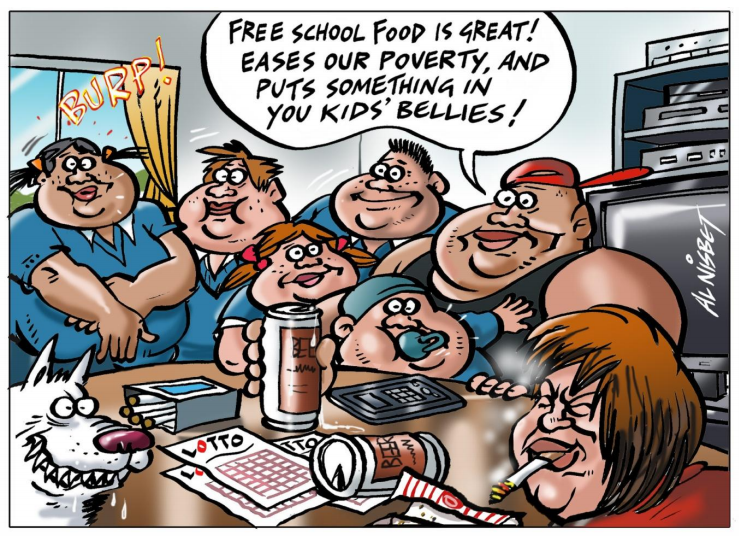
The New Zealand High Court has dismissed an appeal over two cartoons depicting Māori and Pacific Islands people as "lazy, neglectful, gluttonous smokers and drinkers", finding that the drawings are clearly insulting but do not fall foul of the law.
The cartoons, penned in reference to a free school breakfast program, were drawn by Al Nisbet and published in The Marlborough Express and The Christchurch Press by Fairfax Media in May 2013.
One shows a man and woman walking with a free school meal, and the man says "Psst! If we can get away with this, the more cash left for booze, smokes and pokies!"
The other shows a family praising the free school meal program with beers, lottery tickets and cigarettes on the table in front of them.
New Zealand Labour MP Louisa Wall complained about the cartoons to the Human Rights Review Tribunal, arguing they breached section 61 of the New Zealand Human Rights Act, which prohibits acts that would cause racial disharmony.

The Tribunal found the cartoons did not breach the law in May 2017. Wall subsequently appealed the decision in the High Court.
In a joint judgement on February 12, a panel consisting of justice Matthew Muir, Dr. Huhana Hickey, and Brian Neeson, agreed with the tribunal and dismissed Wall's appeal.
The panel wrote that "the publications, although offensive, were not likely to excite hostility or contempt at the level of abhorrence, delegitimisation and rejection that we consider could realistically threaten racial disharmony in New Zealand and which is therefore captured by [section 61]".
The panel considered the editorial context of the cartoons and how they were received in New Zealand society.
"We accept, for example, that cartoon representations of Jews, often as physically deformed Shylock-like characters consistently acting against the good of the German people, formed part of the propaganda employed by the Third Reich and with inevitable consequences in terms of shaping public opinion against that particular racial group," the decision reads.
"But this example is a very considerable distance from the circumstances prevailing in a liberal democracy like New Zealand."
The provocative cartoons generated significant feedback from readers. Ten thousand people responded to an online poll run by The Marlborough Express about whether people were offended by the cartoon, when such polls typically receive around 300 responses.
"Approximately a quarter of respondents were 'offended' by the cartoon and three quarters were not," the judgment reads.

The panel agreed the cartoons were offensive, but stressed they needed to have incited hostility or contempt in order to breach the Human Rights Act.
"The depiction of Māori and Pasifika parents as lazy, neglectful, gluttonous, smokers and drinkers is undoubtedly insulting in that sense," the decision reads.
They also cautioned the publishers of the cartoons to reflect on their actions.
"The unanimous view of both the Tribunal and this panel’s members that the
cartoons were objectively offensive should in our view be a cause for reflection by the respondents and their respective editorial teams," the judgement reads.
The panel noted that they believed Wall had acted "entirely reasonably" in bringing the appeal.
